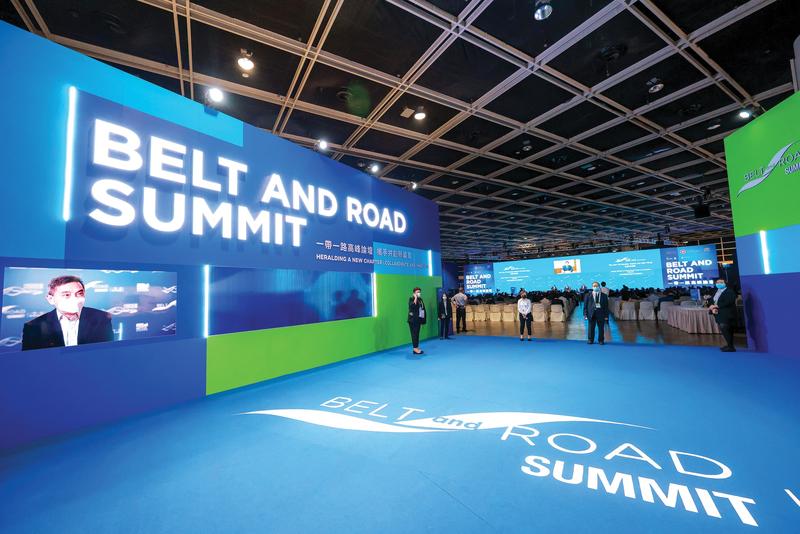 A scene from the Hong Kong Convention and Exhibition Centre, where the two-day summit took place. (ANDY CHONG / CHINA DAILY)
A scene from the Hong Kong Convention and Exhibition Centre, where the two-day summit took place. (ANDY CHONG / CHINA DAILY)
Hong Kong is bound to reap the benefits of deepening regional cooperation by virtue of the central government’s support and its distinct advantages, according to speakers at the seventh Belt and Road Summit.
Delivering a virtual address at the summit on Wednesday, the first day of the two-day event, Commerce Minister Wang Wentao said that the ministry will continue to support Hong Kong leveraging its competitive advantages while participating in the joint building of the Belt and Road.
Wang said the ministry will help Hong Kong consolidate and promote its status as an international trade, financial and shipping hub, and facilitate the smooth flow of trade.
The ministry is happy to see the special administrative region participate in important exhibitions such as the China International Import Expo as Hong Kong seeks to develop new trade modes and introduce more international high-quality goods and services to the Chinese-mainland market, Wang said.
He said that the ministry will also support Hong Kong’s early accession to the Regional Comprehensive Economic Partnership in order to expand regional economic cooperation.
The RCEP agreement is the largest ever trade deal, which took effect in January. The 15-nation bloc accounts for about 30 percent of the world’s GDP and population.
Hao Peng, chairman of the State-owned Assets Supervision and Administration Commission, said in a video that the commission will fully support collaboration between the country’s centrally administered State-owned enterprises (SOEs) and Hong Kong to foster growth in the joint building of the Belt and Road.
“We hope to leverage Hong Kong’s free and open environment as well as its advantages in finance, law, accounting, design, and supervision to promote more qualified central SOEs to issue bonds, set up regional headquarters and trade platforms in Hong Kong,” Hao said.
He added that the moves could help the central SOEs enhance capabilities in risk management, corporate governance, and international operations.
Lin Nianxiu, vice-chairman of the National Development and Reform Commission, said via video link at the opening session that Hong Kong has given full play to its role as a unique functional platform and achieved positive progress in contributing to the Belt and Road Initiative over the past few years.
Lin said the SAR government has signed free trade agreements with 12 countries and investment agreements with 18 countries under the Belt and Road Initiative, adding that the city has also gained ground in arbitration services, financial connections and cultural exchanges.
He added that Hong Kong should foster new strengths under the Belt and Road Initiative, such as developing professional services, promoting the internationalization of the Chinese yuan, and deepening scientific and technological innovation.
Zhang Xiangchen, deputy director-general of the World Trade Organization, said that the COVID-19 pandemic, geopolitical tensions, climate change and anti-globalization sentiment are the four major factors that could affect the reshaping of the landscape of global trade policies.
These factors are very challenging but “can still be managed well if the whole world works together”, he said.
“To address these challenges, I strongly encourage enhanced dialogue and cooperation between all governments to find collective solutions because none of these challenges can be addressed by one government alone. Global challenges require global solutions,” Zhang said.
The Belt and Road Initiative was proposed by President Xi Jinping in 2013, with its main goals being policy coordination, connectivity of infrastructure, unimpeded trade, financial integration, and closer people-to-people ties.
China has signed cooperation documents with more than 180 countries, regions, and international organizations under the initiative. Total trade among economies involved in the initiative exceeded $10 trillion, while direct investment surpassed $140 billion.
Themed “Heralding a New Chapter: Collaborate and Innovate” and held in a hybrid in-person/online format this year, the summit was also among the major events to celebrate the 25th anniversary of the establishment of the HKSAR.
More than 6,000 senior government officials and business leaders from over 80 countries and regions signed up for the event to share business and collaboration opportunities associated with the Belt and Road Initiative.


